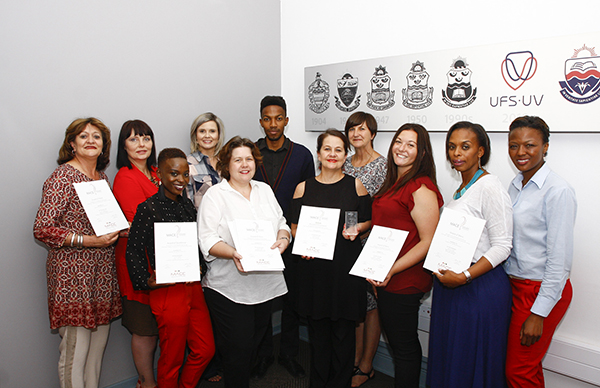
The team from the Department of Communication and Brand Management,
UFS Marketing and Institutional Advancement who received awards at the
2017 Annual National MACE Congress.
Photo: Supplied
The Departments of Communication and Brand Management, UFS Marketing, and Institutional Advancement collectively won 16 awards during the 2017 Excellence Awards presented by the National Association of Marketing, Advancement, and Communication in Education (MACE), which took place in Johannesburg on 30 November 2017.
Shared experiences and best practices
The awards ceremony is part of the MACE Annual National Congress, which took place from 29 November to 1 December 2017 at the Wits School of Governance. The MACE Congress is a platform on which experts from the fields of marketing, advancement, and communication share experiences and best practices. This year’s programme included speakers such Basetsana Kumalo, CEO of Basetsana Woman Investment Holdings and a former Miss South Africa (1994), and first runner-up in the Miss World Pageant, Saint-Francis Tohlang, independent trend analyst and writer, Emma Sadleir, founder of the Digital Law Co and Leanne Manas, multiple award-winning TV presenter.
Celebrating successes
Lacea Loader, Director of the Department of Communication and Brand Management at the University of the Free State, received an Award of Excellence Gold for the UFS Graduations Ceremonies Communication Strategy and an Award of Excellence for the UFS Rector’s inauguration and welcoming ceremonies.
Mamosa Makaya, Deputy Director: Integrated Communication received two Merit Awards for, respectively, the Dumela newsletter and the Visitor’s Guide. Jóhann Thormählen, former employee in the department’s Internal Communication Unit, received an Award of Merit for the Wayde van Niekerk Campaign and an Award of Excellence Gold for the Student Newsletter. Thabo Kessah, also from Internal Communication, on the UFS Qwaqwa Campus, received an Award of Merit for the UFS Qwaqwa Campus Open Day video.
"I am extremely proud of what we
have achieved this year and of
the quality and standard of the
work produced."
Martie Nortjé, Assistant Director of the Unit for Branding and Merchandise received an Award of Merit for KovsieGear Qwaqwa: Live the brand and set the trend. Leonie Bolleurs, Assistant Director of the Unit for Internal Communication received two Awards of Merit, for respectively, the UFS Schools Marketing Video and the UFS Corporate Profile and UFS Fingertips brochures.
Ilze Bakkes from UFS Marketing received the Chairperson’s Award of Excellence for her entry, Top Achievers Early Bird Registration. The award is for the highest-scoring entry across all divisions. She also brought home the Award of Excellence Gold for Registration branding and communication – The Lighthouse Campaign, the Award of Excellence Gold for the Kick-Start Your “I-Want-To-B” Grade 9 Subject Choice Booklet and the Award of Excellence Gold for the Top Achievers Early Bird Registration project. Chantel Koller, also from UFS Marketing, received an Award of Merit for her Star of Stars Competition entry.
The Institutional Advancement (IA): Alumni event planning committee received an Award of Excellence Gold for their entry: Chancellor’s Distinguished Alumni Awards Dinner. The committee consisted of Helen Namponya, Ntokozo Nkabinde, Tertia de Bruin, Nhlanhla Modzanane, and Elmada Kemp.
IABC Africa Award
“This is the second year in a row that the department has received so many accolades from its peers at MACE. I am extremely proud of what we have achieved this year and of the quality and standard of the work produced. The fact that we were also again acknowledged by the Africa Chapter of the International Association of Business Communicators (IABC) is also commendable,” said Loader. She is also the National Chairperson of MACE.
Earlier this year, the Department of Communication and Brand Management received an IABC Africa Award of Excellence for the UFS 2017 Winter Graduation Ceremonies Communication Strategy from the International Association for Business Communicators (IABC). Loader collected the award during the Silver Quill Awards ceremony on 3 November 2017 in Cape Town.